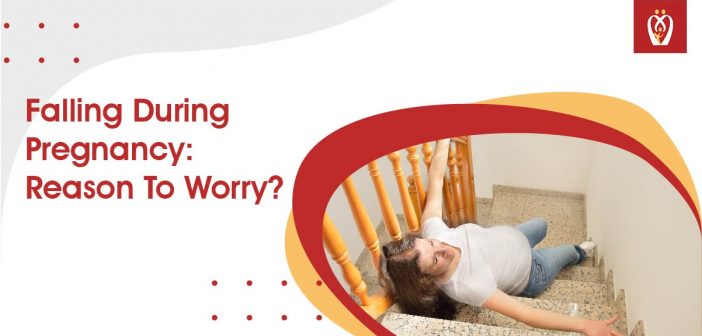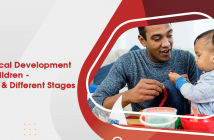A stumble or fall during pregnancy can sometimes happen because of clumsiness due to loosening ligaments and joints and that big ol’ belly throwing you off balance. Add to that an inclination for drifting off into new-mama fantasyland on your afternoon walk, and you miss the curb and land squarely on your baby bump.
Don’t worry. While falling during pregnancy can be inconvenient and even painful, it is not uncommon, and your baby is unlikely to be harmed. What’s the reason? The amazing uterus in your body is lined with muscles and filled with amniotic fluid, which can cushion most blows.
Still, because you’ll likely feel shaken if you fall during pregnancy, here’s more on what can happen if you do stumble and how to avoid it in the first place.
What happens if you fall during pregnancy?
Falls are common during pregnancy, and the chances are that you and your baby will be fine. However, ensure to notify your general practitioner of the spill and confirm that everything is fine.
However, your GP/midwife will provide you with a proper diagnosis and treatment plan if you’ve had a more severe fall. Or may have sprains, broken bones, and other issues.

pregnancy
It’s also normal to be concerned about the baby or falling again, but try not to worry too much. If you can’t seem to get rid of your anxiety or concern, talk to your OB/GYN or midwife about it.
Could falling while pregnant hurt your unborn baby?
While you may feel embarrassed and shaken after your tumble, an unintentional fall is unlikely to harm your baby. Your belly allows you to withstand harsh conditions during pregnancy to protect your baby.
For starters, the shock-absorbing amniotic fluid surrounds your baby, a muscular uterus, membranes, and your abdominal cavity (made up of muscle and bones). Any blow needs to penetrate all those protective layers to affect your baby.
And, if you’re concerned that a fall will result in a miscarriage, try not to worry. Falling hard on your bottom is unlikely to harm the baby. But there are chances of placental abruption if there is significant direct trauma to your abdomen in the second or third trimesters. At first, your pelvis protects your uterus and shields it from trauma.
Why do accidental falls happen during pregnancy?
There are numerous reasons why pregnancy, particularly the third trimester, can be difficult.
Firstly, your expanding stomach shifts your center of gravity forward, making it more challenging to stay upright, especially on uneven surfaces like a sidewalk curb.
Furthermore, the pregnancy hormone relaxin causes your joints to become looser as you get closer to delivery. This hormone will eventually benefit you because it allows your pelvic joints and connective tissues to stretch during delivery, making it easier to push your baby out. However, until then, your loose joints can make you unsteady on your feet and more likely to fall.
Don’t forget that you’re probably exhausted, uncomfortable, preoccupied, and overwhelmed, too (pregnancy will do that to you!) — all of which would put anyone at an increased risk of tripping.
How to Prevent Pregnancy Falls?
You may be able to avoid falling while pregnant by taking a few precautions and forming new habits. Here are some helpful tips to consider:
Pick flats over heels.
Shoes with flat soles or sneakers are better than tippy wedges or heels. However, avoid flat flip-flops, which can be unstable for walking.
Use the railings.
It may seem obvious, but always hold the rail for extra support as you walk up and down the stairs.
Move slowly.
When you’re expecting, there’s no need to hurry! Instead, take your time moving around the house or running errands.
Look for smooth paths.
Sidewalks are preferable to uneven surfaces like grass or bumpy trails in the woods for walking.
Avoid heavy loads.
Carrying that massive laundry basket isn’t going to make you a superhero. Instead, divide the work among family members.
Bike in place.
If you enjoy cycling, stick to stationary wheels because your growing middle can challenge your balance, making riding a standard bike riskier.
Maintain your energy levels.
Keep healthy snacks and a small water bottle in your purse or desk to avoid dizziness caused by low blood sugar or thirst.
Remove any potential tripping hazards.
Remove loose throw rugs (or place a no-slip pad underneath) and keep toys, books, and magazines off the floor to prevent falls at home.
When to see your GP/midwife?
Contact your practitioner immediately if you experience discomfort or prolonged pain, notice decreased fetal movement, or have any vaginal bleeding or contractions. It is especially crucial if you have had direct contact with the front or side of your abdomen. If the bleeding is inside the uterus but not coming through the vagina, it could be a concealed abruption.
Depending on the severity of the injury, your GP/midwife may request fetal heart rate monitoring or ultrasound to ensure everything is in order inside.
It’s always better to be safe and consult with a GP/midwife about any situation that worries you, especially if you’re feeling rattled or worried. And, if you’re unsure whether you need a check after a fall, call anyway, if only for reassurance. With the Nurturey pregnancy app, you can quickly make an appointment with your GP/midwife.
A fall during pregnancy can be frightening, but your body is capable of protecting your growing baby. And, with a few changes around the house and in your daily routine, you can help prevent future falls.
About the Nurturey Pregnancy App
The PinkBook by Nurturey is a “digital substitute” for the NHS’s Red Book. The PinkBook allows pregnant women and parents to access their child’s health records, view upcoming health checkups, and access trusted NHS information about pregnancy or parenting. If you are pregnant and have questions, use the Nurturey pregnancy app to schedule an appointment with your GP or midwife. You can also schedule appointments, refill prescriptions, and communicate with your GP/midwife.







